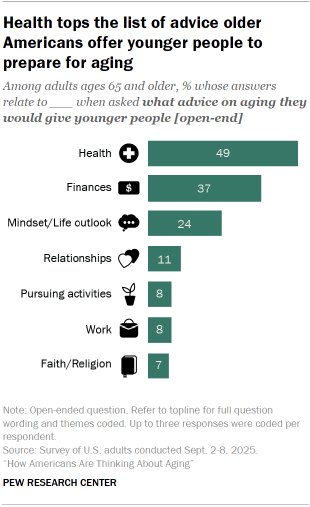As part of a survey of 8,750 U.S. adults aimed at understanding how Americans are thinking about and experiencing aging, we asked 2,582 Americans ages 65 and older the following question: “Based on your own experiences, what advice would you give to younger people to help them prepare for getting older?”
Respondents answered this question in their own words. We then coded their responses into categories based on the themes they mentioned, up to three per person. Read key findings from the full study.
About half of older Americans (49%) offered advice related to health, such as having a nutritious diet, engaging in regular exercise and keeping up with medical appointments. Older women are more likely than older men to offer health advice (52% vs. 46%).

The second-most common type of advice related to finances (37%). While many older adults simply stressed the necessity of saving money, some went into more detail about investment strategies.
About a quarter of older Americans (24%) talked about having a particular mindset or outlook toward life, advising that younger people enjoy their life, cherish every moment or live with gratitude. This theme also encompasses various general life advice, such as being true to oneself, being independent and helping others.
Smaller shares of older adults offered advice about:
- Relationships: 11% mentioned things like building a family and spending time with loved ones or having good friends and an active social life.
- Activities: 8% gave advice related to hobbies, interests and volunteer work, including 2% who specifically mentioned travel.
- Work: 8% mentioned working hard or having a good, stable or fulfilling job.
- Religious faith: 7% gave advice related to religion, with many specifically mentioning prayer, going to church or living a spiritual life.
The advice from older adults aligns with the worries that people under 65 have about aging. Among younger adults who feel worried when they think about their lives in their 70s and beyond at least sometimes, health and finances top the list of things they worry about.
Read more about younger adults’ worry and excitement about aging.




